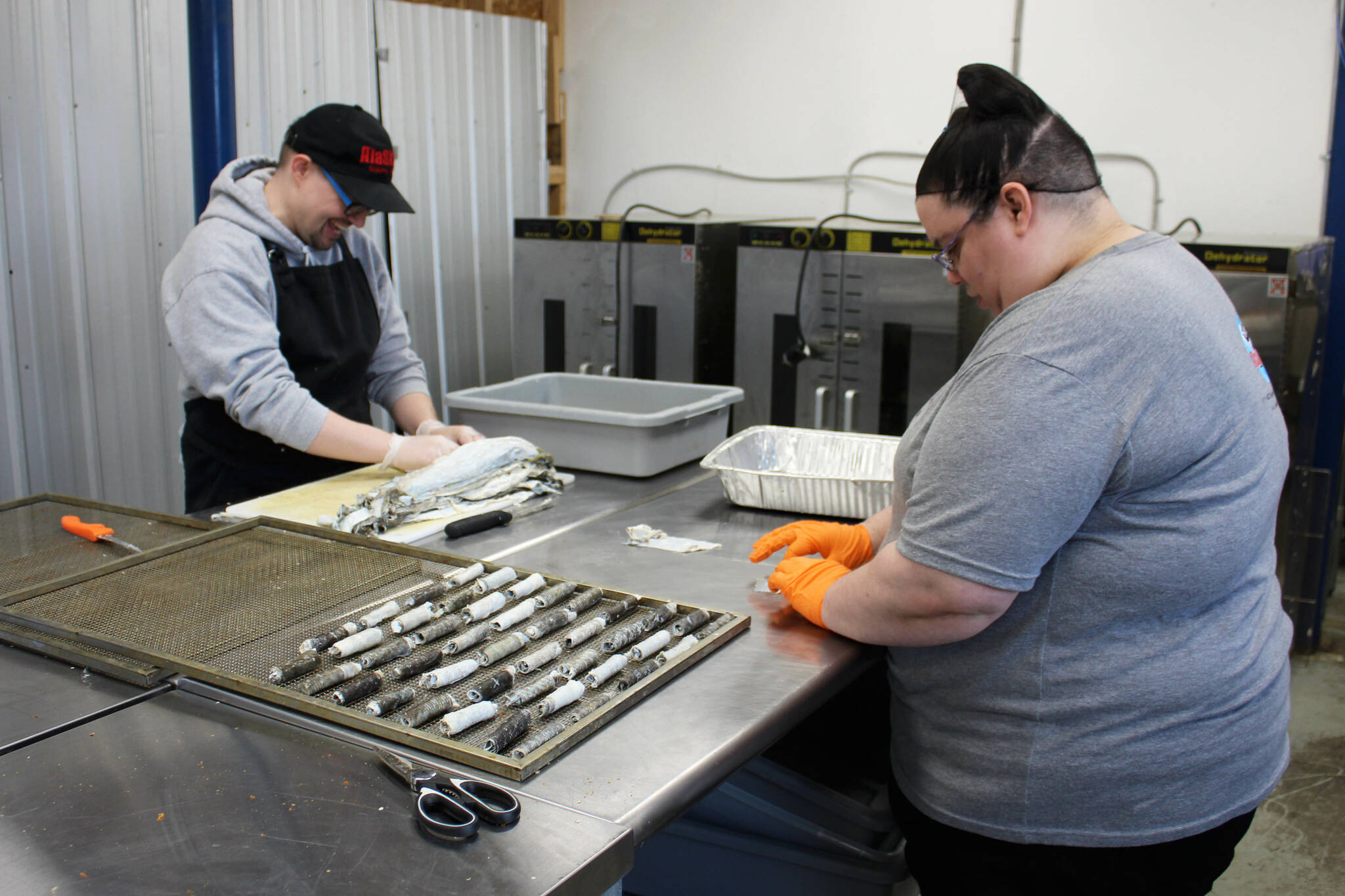A local business familiar for its high-quality and authentically Alaska pet treats got a treat of its own Thursday.
Soldotna’s AlaSkins, owned and operated by lifelong Alaskan Sara Erickson, was presented Thursday with the Alaska Department of Commerce, Community and Economic Development’s Made in Alaska Manufacturer of the Year Award during a ceremony held at the business headquarters.
Alaska’s Manufacturer of the Year Award has been given annually since 1991 and recognizes businesses that have demonstrated excellence in manufacturing, community engagement and collaboration with other businesses.
Presenting the award — a wooden bowl stamped with the familiar “Made in Alaska” seal — on behalf of the State of Alaska were Made in Alaska Program Manager Grace Beaujean and Program Coordinator Claire Campbell.
Erickson said she grew up commercial fishing in Bristol Bay with her dad, who would often remark that discarded skins carry some of the best parts of the fish, like nutrients and oils. She first dabbled in dehydrating fish skins in 2016, when she placed an order for pink salmon skins from Seward and fired up a countertop dehydrator. Four years later, AlaSkins opened.
In selecting AlaSkins for this year’s award, Beaujean and Campbell said Erickson’s operation demonstrated excellence in the five categories of innovation the program’s scoring committee considers, such as the collaboration with other Alaska businesses, how the business has overcome adversity and general business growth.
“It’s really exciting to see a business innovating and making something out of something that would otherwise go to waste — so environmentally conscious as well as economically,” Campbell said. “So yeah, we’re very proud to present this award to AlaSkins. Thank you for enriching the lives of Alaskans and their pets and helping to grow our economy.”
Erickson’s products, which range from rolled fish skin pet treats to canned fish and CBD pet snacks, are now sold in more than 70 stores around Alaska and can ship anywhere in the United States thanks to a robust online presence. The business, though, hasn’t been without its struggles.
Being a small, woman-owned business is already tough, Erickson said, and when AlaSkins opened in 2020, amid the COVID-19 pandemic, it struggled to stay afloat. Erickson said she spent a lot of money on gas driving to a manufacturing plant in Kenai, all while trying to open a retail site in Soldotna and being ineligible for many small business grants funded with COVID relief money.
“Alaska is really a tough spot to be an entrepreneur and doing something cool,” she said.
Still, there is something about the simplicity and freshness of AlaSkins, she said, that resonates with customers.
“I really believe in Alaska and our product,” Erickson said. “Alaska seafood is phenomenal. It’s better than anything in the world and we have a lot to market.”
At the AlaSkins shop and manufacturing space Thursday, employees Jeramie Davis and Lillie VanDevere were busy rolling the latest batch of treats. One by one, Davis lifted a slimy cod skin from the top of a pile, sliced it into thick squares, then rolled it and put it on a mesh tray for dehydration.
Erickson estimates that her team of six part-time employees can process about 100 pounds of fish per day. Davis said how many treats they can make on a given day depends on the configuration of the fish skins when they arrive at AlaSkins.
“Some of it comes out really wrinkly and you have to really fight with it,” Davis said of the fish skins.
The fish skins used to make AlaSkins treats, Erickson said, come mostly from fish processors in Alaska that are willing to set aside the skins for shipment to Soldotna. A lot of her salmon skins, she said, come from Washington, because salmon filets in Alaska are often sold with the skin still attached.
When it comes to fish processors, Erickson said fish skins often end up discarded. Saving those skins and getting them to Soldotna is a separate paid service that not every processor provides.
“It’s easier for them to throw it away than it is for them to save the skins from falling on the ground, package them up, flash freezing it for us — which kills all the bugs, and then packaging and boxes and then, getting on a pallet for us to either pick up or ship to us,” she said. “It’s a pain in the butt.”
There’s no shortage of demand though, when the skins are rolled, dehydrated and packaged. AlaSkins products reliably fly off the shelf when restocked, Erickson and Davis said.
“Every time we stock that shelf, like clockwork, next week it’s gone,” Davis said.
Looking ahead, Erickson said she’s excited to explore a new partnership through which she will incorporate more Alaska seaweed into her products. AlaSkins currently packages treats in single-use plastic bags, which Erickson said can catch the oils that run off of the dehydrated fish skins, but she’d like to see seaweed used as some type of sustainable packaging.
Undoubtedly the most cheerful companion during Thursday’s celebration was Max, Erickson’s 10-year–old black lab and the face of AlaSkins, who wandered happily between attendees, seeking pets and occasionally munching on fish skin treats. Erickson said Max is always the first to try new AlaSkins products.
“Max has been with me through the whole process,” Erickson said.
Also there to celebrate Erickson’s accomplishments were Kenai Peninsula Borough Mayor Peter Micciche, State Rep. Justin Ruffridge, R-Soldotna, staff from the Soldotna Chamber of Commerce, Soldotna City Manager Janette Bower, Soldotna Director of Economic Development and Planning John Czarnezki and Jill Schaefer, with Gov. Mike Dunleavy’s office.
AlaSkins is located at 44761 Sterling Highway. More information about the business can be found at alaskins.com.
Reach reporter Ashlyn O’Hara at ashlyn.ohara@peninsulaclarion.com.


